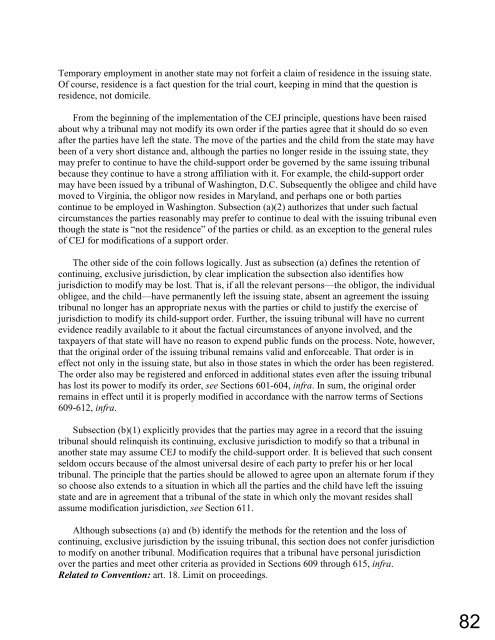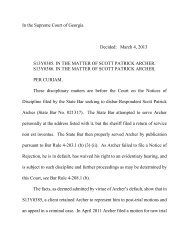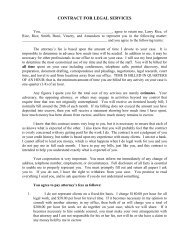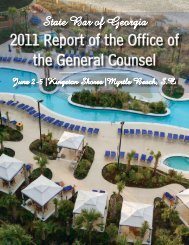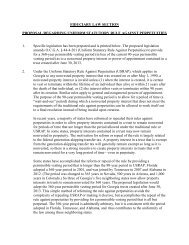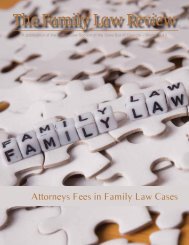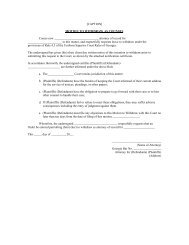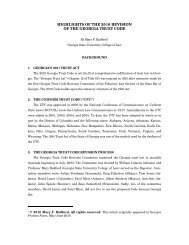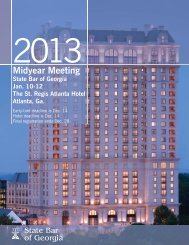2008 Amendments to the Uniform Interstate Family Support Act ...
2008 Amendments to the Uniform Interstate Family Support Act ...
2008 Amendments to the Uniform Interstate Family Support Act ...
Create successful ePaper yourself
Turn your PDF publications into a flip-book with our unique Google optimized e-Paper software.
Temporary employment in ano<strong>the</strong>r state may not forfeit a claim of residence in <strong>the</strong> issuing state.<br />
Of course, residence is a fact question for <strong>the</strong> trial court, keeping in mind that <strong>the</strong> question is<br />
residence, not domicile.<br />
From <strong>the</strong> beginning of <strong>the</strong> implementation of <strong>the</strong> CEJ principle, questions have been raised<br />
about why a tribunal may not modify its own order if <strong>the</strong> parties agree that it should do so even<br />
after <strong>the</strong> parties have left <strong>the</strong> state. The move of <strong>the</strong> parties and <strong>the</strong> child from <strong>the</strong> state may have<br />
been of a very short distance and, although <strong>the</strong> parties no longer reside in <strong>the</strong> issuing state, <strong>the</strong>y<br />
may prefer <strong>to</strong> continue <strong>to</strong> have <strong>the</strong> child-support order be governed by <strong>the</strong> same issuing tribunal<br />
because <strong>the</strong>y continue <strong>to</strong> have a strong affiliation with it. For example, <strong>the</strong> child-support order<br />
may have been issued by a tribunal of Washing<strong>to</strong>n, D.C. Subsequently <strong>the</strong> obligee and child have<br />
moved <strong>to</strong> Virginia, <strong>the</strong> obligor now resides in Maryland, and perhaps one or both parties<br />
continue <strong>to</strong> be employed in Washing<strong>to</strong>n. Subsection (a)(2) authorizes that under such factual<br />
circumstances <strong>the</strong> parties reasonably may prefer <strong>to</strong> continue <strong>to</strong> deal with <strong>the</strong> issuing tribunal even<br />
though <strong>the</strong> state is “not <strong>the</strong> residence” of <strong>the</strong> parties or child. as an exception <strong>to</strong> <strong>the</strong> general rules<br />
of CEJ for modifications of a support order.<br />
The o<strong>the</strong>r side of <strong>the</strong> coin follows logically. Just as subsection (a) defines <strong>the</strong> retention of<br />
continuing, exclusive jurisdiction, by clear implication <strong>the</strong> subsection also identifies how<br />
jurisdiction <strong>to</strong> modify may be lost. That is, if all <strong>the</strong> relevant persons—<strong>the</strong> obligor, <strong>the</strong> individual<br />
obligee, and <strong>the</strong> child—have permanently left <strong>the</strong> issuing state, absent an agreement <strong>the</strong> issuing<br />
tribunal no longer has an appropriate nexus with <strong>the</strong> parties or child <strong>to</strong> justify <strong>the</strong> exercise of<br />
jurisdiction <strong>to</strong> modify its child-support order. Fur<strong>the</strong>r, <strong>the</strong> issuing tribunal will have no current<br />
evidence readily available <strong>to</strong> it about <strong>the</strong> factual circumstances of anyone involved, and <strong>the</strong><br />
taxpayers of that state will have no reason <strong>to</strong> expend public funds on <strong>the</strong> process. Note, however,<br />
that <strong>the</strong> original order of <strong>the</strong> issuing tribunal remains valid and enforceable. That order is in<br />
effect not only in <strong>the</strong> issuing state, but also in those states in which <strong>the</strong> order has been registered.<br />
The order also may be registered and enforced in additional states even after <strong>the</strong> issuing tribunal<br />
has lost its power <strong>to</strong> modify its order, see Sections 601-604, infra. In sum, <strong>the</strong> original order<br />
remains in effect until it is properly modified in accordance with <strong>the</strong> narrow terms of Sections<br />
609-612, infra.<br />
Subsection (b)(1) explicitly provides that <strong>the</strong> parties may agree in a record that <strong>the</strong> issuing<br />
tribunal should relinquish its continuing, exclusive jurisdiction <strong>to</strong> modify so that a tribunal in<br />
ano<strong>the</strong>r state may assume CEJ <strong>to</strong> modify <strong>the</strong> child-support order. It is believed that such consent<br />
seldom occurs because of <strong>the</strong> almost universal desire of each party <strong>to</strong> prefer his or her local<br />
tribunal. The principle that <strong>the</strong> parties should be allowed <strong>to</strong> agree upon an alternate forum if <strong>the</strong>y<br />
so choose also extends <strong>to</strong> a situation in which all <strong>the</strong> parties and <strong>the</strong> child have left <strong>the</strong> issuing<br />
state and are in agreement that a tribunal of <strong>the</strong> state in which only <strong>the</strong> movant resides shall<br />
assume modification jurisdiction, see Section 611.<br />
Although subsections (a) and (b) identify <strong>the</strong> methods for <strong>the</strong> retention and <strong>the</strong> loss of<br />
continuing, exclusive jurisdiction by <strong>the</strong> issuing tribunal, this section does not confer jurisdiction<br />
<strong>to</strong> modify on ano<strong>the</strong>r tribunal. Modification requires that a tribunal have personal jurisdiction<br />
over <strong>the</strong> parties and meet o<strong>the</strong>r criteria as provided in Sections 609 through 615, infra.<br />
Related <strong>to</strong> Convention: art. 18. Limit on proceedings.<br />
82


